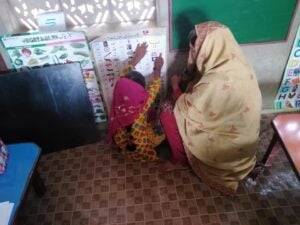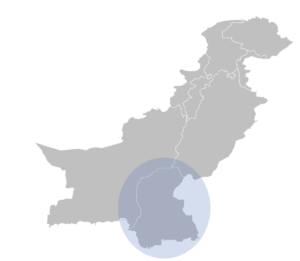An estimated 77% of three- to five-year-olds in Pakistan lack access to early childhood care and education (ECCE) services nationally (1). In the Sindh Province, ECCE services are even more limited, with 84% of three- to five-year-olds out-of-school (1). A major barrier to ECCE expansion is the lack of a trained ECCE workforce (2). Investments in ECCE infrastructure and workforce development are needed to promote children’s lifelong learning, positive mental and physical health, and ability to form happy, healthy relationships.
At the same time, the demand for skills training and employment opportunities among Pakistan’s youth is urgent: 64% of Pakistan’s population is under the age of 29 years, and nearly one third of youth aged 15-24 years is not enrolled in school or employment (3). Pathways for training, job support, and labor force entry among female youth are particularly needed: among 20–24-year-olds, the workforce participation rate for males (86%) is over three times that for females (28%) (4).

The LEAPS program has been implemented by Pakistan’s National Commission for Human Development in rural Sindh as a solution to close ECCE service gaps and concurrently extend training and employment opportunities for female youth by training female youth (aged 18-24 years) as Community Youth Leaders (CYLs) to deliver high-quality ECCE for young children (aged 3.5-5.5 years). Communities donate space for the preschool, and CYLs are provided kits to establish safe, child-friendly classroom environments to enable playful learning. Following initial basic training, CYLs receive monthly on-the-job supervision and regular professional development opportunities. As children become ready to graduate from LEAPS, CYLs work closely with NCHD’s local primary school teachers to ensure children’s successful transition from ECCE into primary school.

The LEAPS program efficacy was previously evaluated in a pilot cluster randomized controlled trial (2015-2016), enrolling 10 communities in district Naushahro Feroze, and found positive impacts on children’s school readiness and executive functioning skills, as well as benefits to youth personal and professional development. Following the pilot, a transition-to-scale study was conducted (2018-2021) to expand LEAPS through NCHD platforms to reach 99 villages across 4 districts: Naushahro Feroze, Khairpur, Sukkur, and Dadu.
LEAPS was supported by a consortium of technical partners led by Harvard T.H. Chan School of Public Health and Aga Khan University.
References:
- Government of Pakistan. Pakistan Social and Living Standards Measurement (PSLM) Survey. Pakistan Bureau of Statistics, G-9/1, Islamabad: Ministry of Planning Development and Special Initiatives; 2021 Jul. Available from: https://www.pbs.gov.pk/content/pakistan-social-and-living-standards-measurement-survey-pslm-2019-20-provincial-district).
- Richter LM, Daelmans B, Lombardi J, Heymann J, Boo FL, Behrman JR, Lu C, Lucas JE, Perez-Escamilla R, Dua T, Bhutta ZA. Investing in the foundation of sustainable development: pathways to scale up for early childhood development. The lancet. 2017 Jan 7;389(10064):103-18.
- United Nations Development Programme (UNDP) Pakistan. Pakistan national human development report: Unleashing the potential of a young Pakistan. Islamabad: UNDP; 2017. Available from: https://www.un.org.pk/undp-pakistan-launches-the-pakistan-national-human-development-report-2017-unleashing-the-potential-of-a-young-pakistan/
- Government of Pakistan Ministry of Planning, Development & Special Initiatives & Pakistan Bureau of Statistics. Key Findings Of Labour Force Survey 2020-21, Thirty-sixth round. Islamabad: Pakistan Bureau of National Statistics; 2022. Available from: https://www.pbs.gov.pk/content/key-findings-labour-force-survey-2020-21
LEAPS Videos



